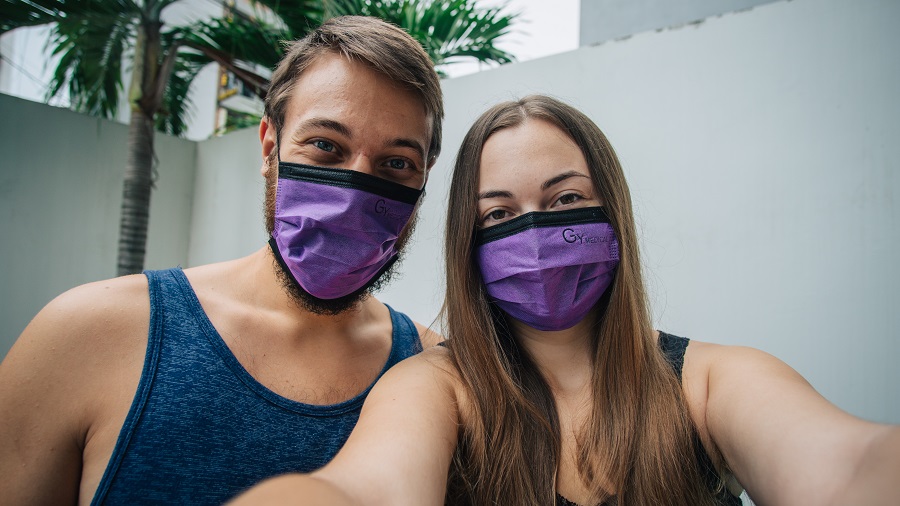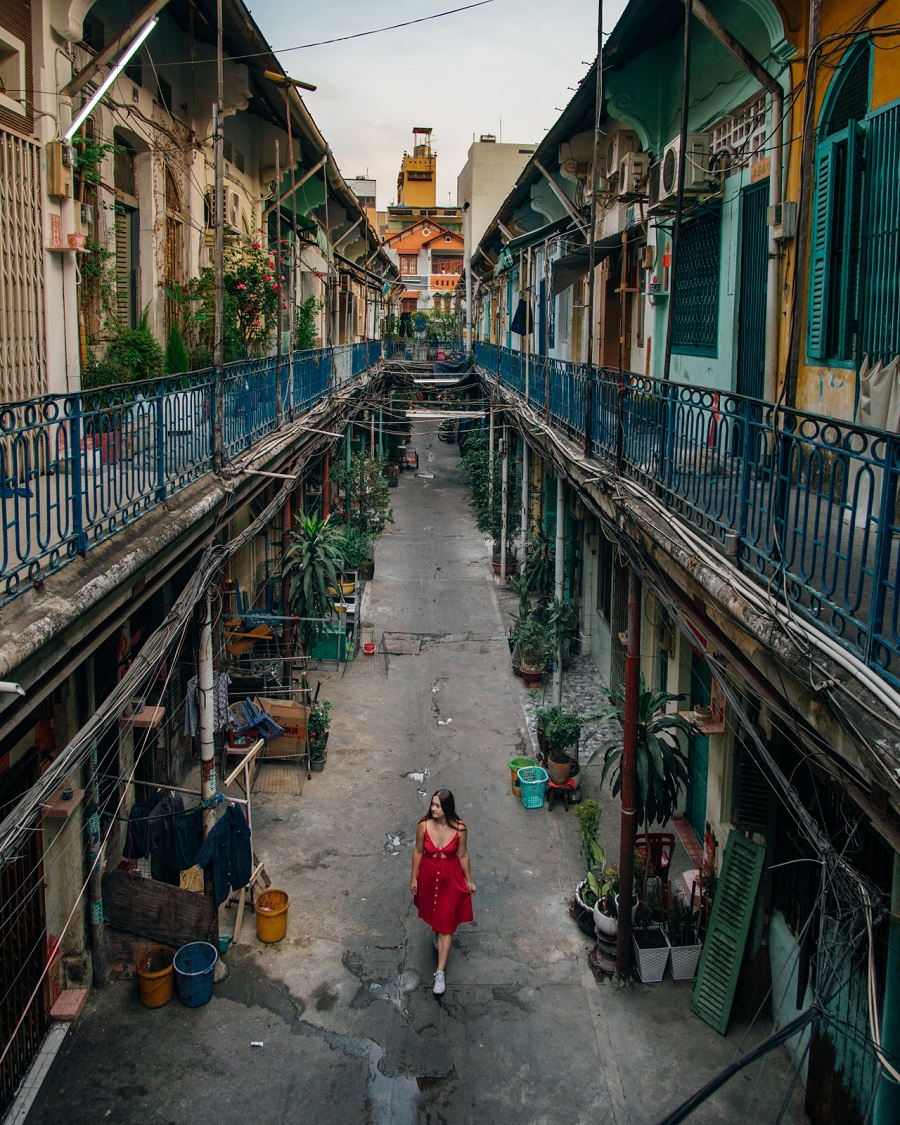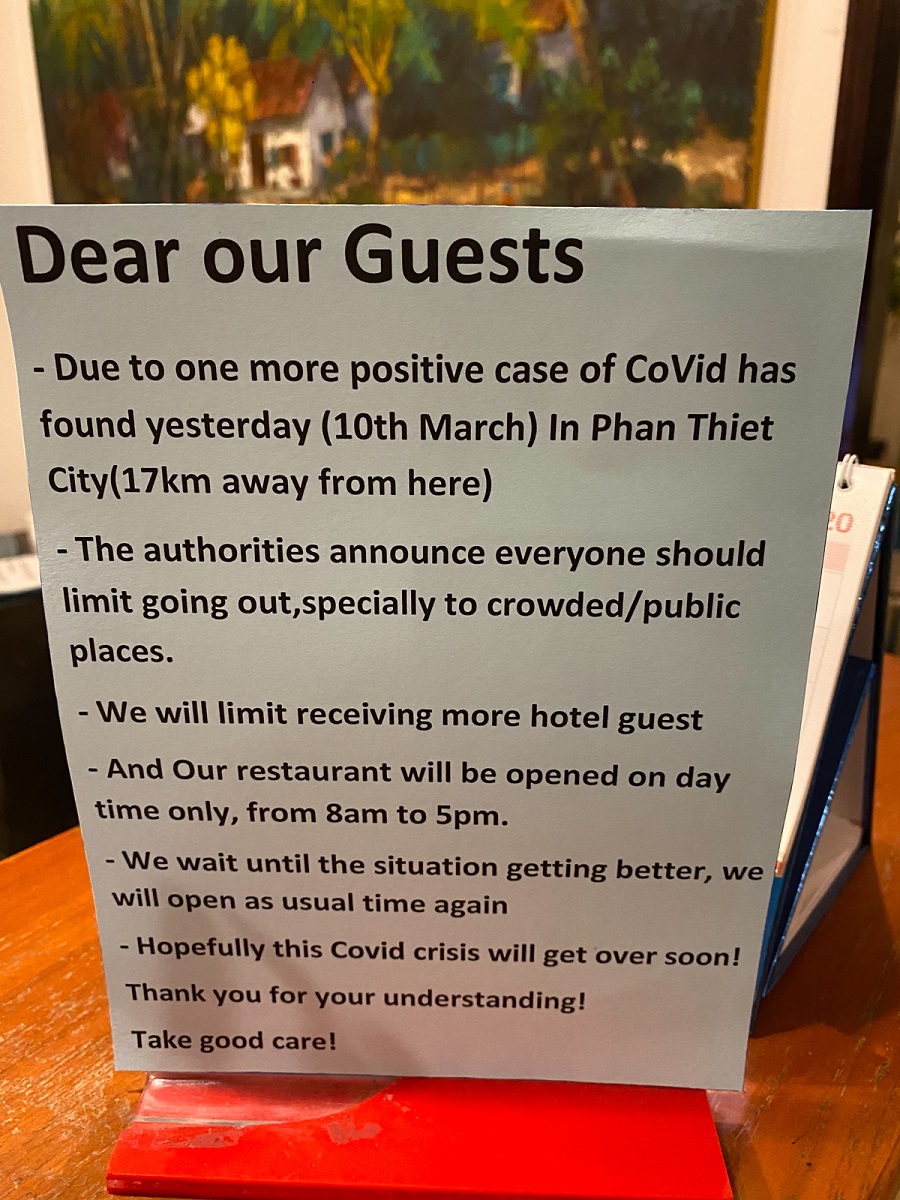How the 1855 Cholera Epidemic on Hvar Paved a Street in Stari Grad
April 18, 2020 - A lovely story from Stari Grad on Hvar about how the cholera epidemic of 1855 was responsible for the cobbles coming to Srinja Kola street in this 2,400-year-old town.
Here is a story about the cobbles of Srinja Kola street in the old town of Stari Grad.
How Middle Street Got Its Cobbles
It just goes to show that while history may not exactly repeat itself, it certainly does rhyme. While Mark Twain may not have had epidemics in mind, this episode proves him correct. Thanks go to Hvar Island Concierge for the story, and to Zdravko Podolski for the eagle eye at spotting it, as well as this translation.
Dinko Gazzari and Marko Niseteo, were doctors responsible for conquering the cholera epidemic that plagued Stari Grad on Hvar in the summer of 1855.
For their contribution they were due to receive gold medals, but they declined and suggested that instead the Middle Street (Srinja Kola) should be paved. Instead of a muddy creek in winter and a dusty mess in summer it got paved in beautiful stone cobbles. (Depicted here in the photo by Vilma Vodanović.
At that time people were hiding in huts and trims (stone field shelters) outside town, and boats anchored in the bay. In shops, coins were dropped into bowls of vinegar, and everyone was careful not to touch anyone else. Strict isolation of all local settlements prevented mass deaths, except in Dol which was loose with its quarantine and several villagers died, and their houses were burnt to prevent the disease spreading. The Gendarmes were very active, and mention should also be made of pharmacist Peter Confalonieri and mayor Peter Scuttari.
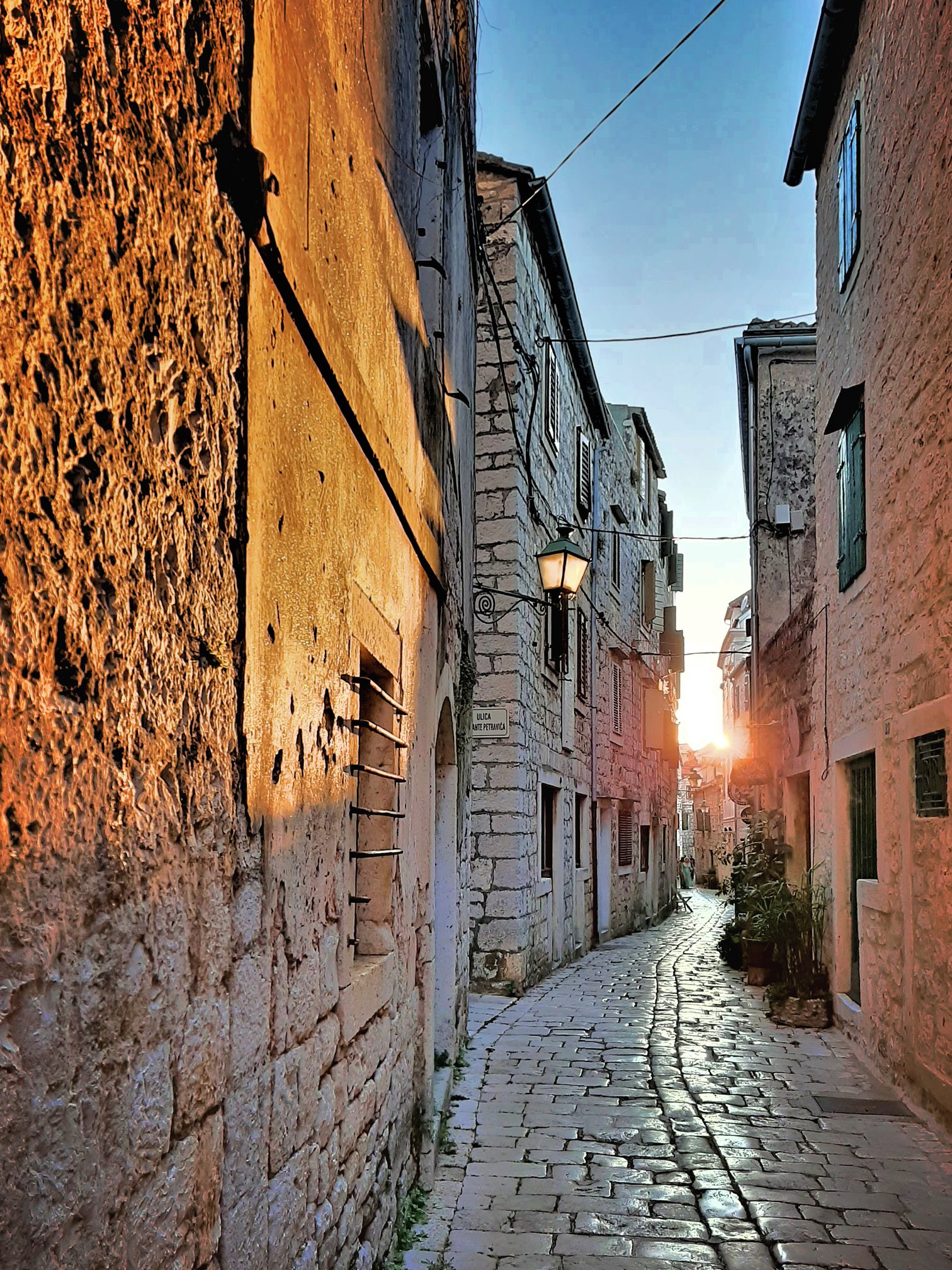
Thanks Hvar Concierge and Zdravko - great story.
And to see how the gorgeous old town of Stari Grad is faring in the corona era, here is yesterday's look at life under lockdown in Stari Grad.
First Virtual Camino Krk Pilgrimage to Be Held on 21-26 April
ZAGREB, April 18, 2020 - The Camino Krk project, developed by the City of Krk Tourism Board and the Croatian Confraternity of St. James which is the member of the archconfraternity of Santiago de Compostela, will be held virtually on 21-26 April, due to the lockdown imposed because of COVID-19.
Last October, the first edition of the Camino week on the Croatian island of Krk was held.
The second edition of the pilgrimage along the 107-kilometre-long route was scheduled for 21-26 April this year.
However, following confinement measures imposed due to the coronavirus infection, local authorities are calling on pilgrims to go on virtual pilgrimage and the itinerary includes the following towns as destinations throughout this northern Adriatic island: Krk, Porat, Omišalj, Dobrinj, Vrbnik, Baška and Kornić.
Following the tradition of Croatian Confraternities of St. James that have been helping pilgrims on their way to Santiago de Compostela since 1203, the Croatian Confraternity of St. James has started with the revitalization of medieval pilgrimage routes leading to Santiago de Compostela, according to the information available on the project's website.
"The island of Krk has been chosen as the first section of the Croatian Camino route to be officially marked with yellow arrows (customized with a Croatian traditional symbols)," it was also stated.
During the pilgrimage, participants can enjoy "spectacular natural scenery, forests, hills with amazing view, old castles and churches, abandoned villages, small medieval town, gorgeous beaches" and "each day offers a unique opportunity to find inner peace, a chance to reflect, to discover that special kind of 'Camino experience'."
More Krk news can be found in the Lifestyle section.
MOST for Slashing VAT on Protective Equipment to 5%
ZAGREB, April 18, 2020 - The MOST party on Saturday presented amendments to the VAT Act proposing that VAT on all protective equipment preventing the spread of COVID-19 be slashed to 5%.
"We believe this is an appropriate proposal at the moment and that it would relieve the whole procurement system for those products," the head of the opposition party's economic council, Mislav Kraljević, told reporters.
He said the party hoped the amendment would be put on parliament's agenda as soon as possible and that other parliamentary parties would support it.
MOST leader Božo Petrov said the party had nine bills aimed at helping businesses and citizens cope with the current crisis.
Asked to comment on the government's dismissal of a Social Democratic Party proposal for a moratorium on loans, he said MOST had been proposing that from the start as well as a moratorium on interest rates and the suspension of enforcement proceedings.
Petrov also commented on the next parliamentary election, saying that because "the virus will last... the most adequate thing would be for the government to enable electronic and postal voting."
More MOST news can be found in the Politics section.
Hvar Supermarkets in the Corona Era: How are Supplies?
April 18, 2020 - The brief panic buying seems to have subsided and supply chains have realigned to a new corona rhythm. So how well-stocked are the Hvar supermarkets, for example?
One of the things we had to think about when deciding to self-isolate on Hvar where our original home is or in Varazdin where we are currently renting was the availability of supplies.
I was not personally too worried about essential supplies running out. In times of crisis, I can think of few places in the world that manage a crisis better than Croatia. From the stories I heard of the war years, the solidarity and togetherness was an important factor in survival during those years. But islands would obviously not be as well-stocked as the mainland. On the other hand, access to the fresh produce from the family field was a major plus factor.
We decided on Hvar and decided not to panic buy. What will be, will be.
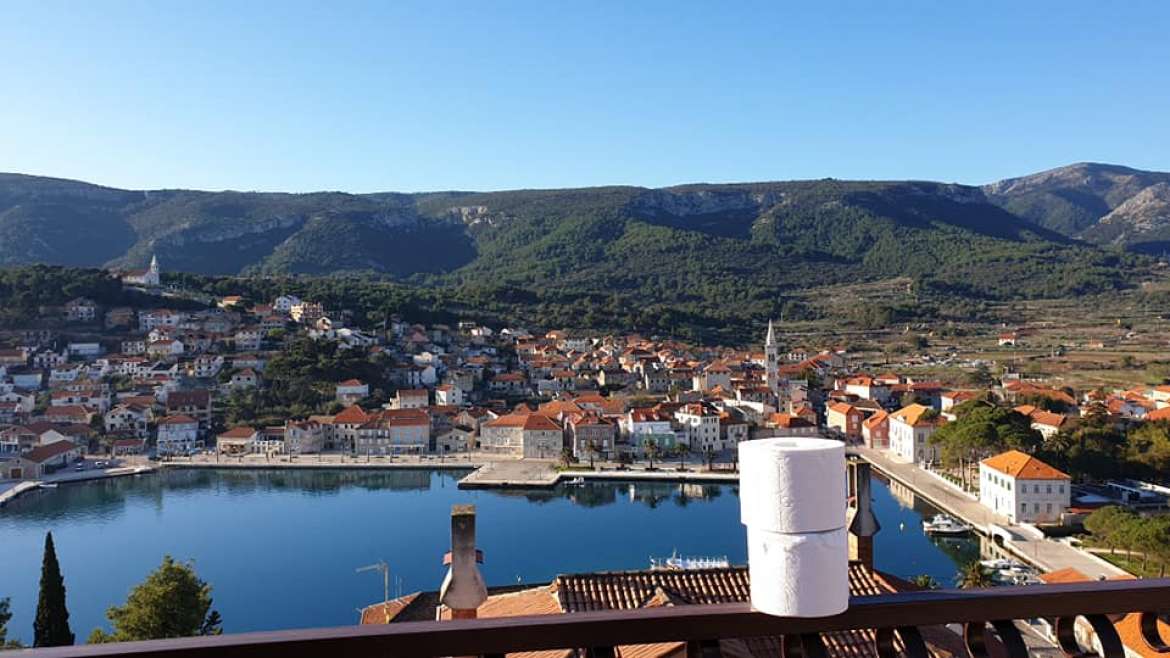
We bought only 20 toilet rolls with us, for example, and as we explored in Toilet Paper, Toilet Paper, My Kingdom for Some Toilet Paper, when you are the only male in a family of four, your allocation from 20 rolls of toilet paper is exactly two.
So one month later, how am I coping? Have we all panic bought the Australian way?
Until yesterday, my life had been confined to my laptop apart from lunch and 30 minutes by the Adriatic each evening. I had had no meaningful discussions with anyone outside for my self-isolation team of 7 for a month. Today I went to see how the situation is in Hvar supermarkets.
As you can see above, no dunny roll crisis here.
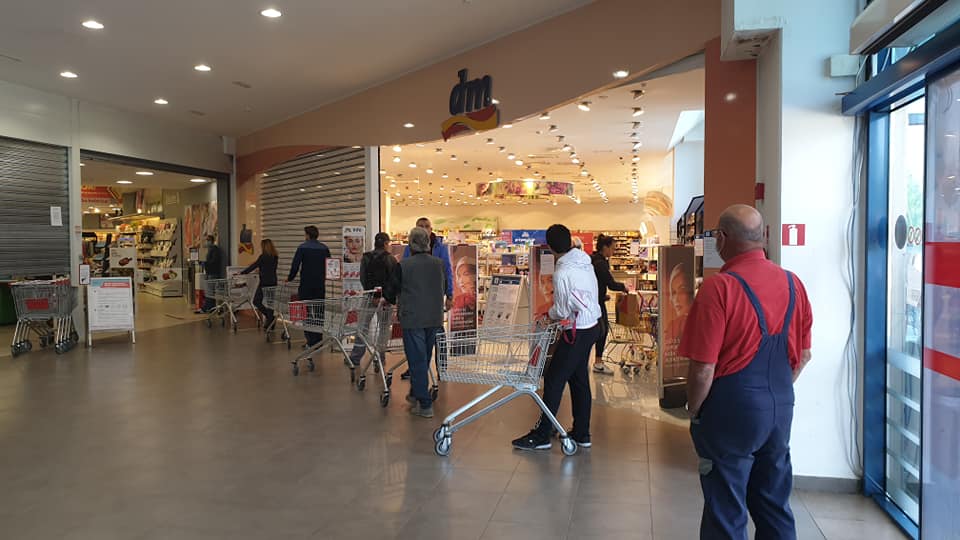
We queued as per the regulations and waiting until our turn came, the obligatory social distancing and hand sanitising before we entered.
I was shocked at what I found inside and I started to film so that others could see the reality of life in Hvar supermarkets at the moment. I was asked by the staff not to film or publish any film online, so sadly I cannot share that with you, and the only photo from inside the store is the toilet paper above.
But I have never seen Tommy, the biggest of the Hvar supermarkets, so well-stocked. I looked around for what might be missing, but did not find anything. Items such as fresh salmon were a surprise.
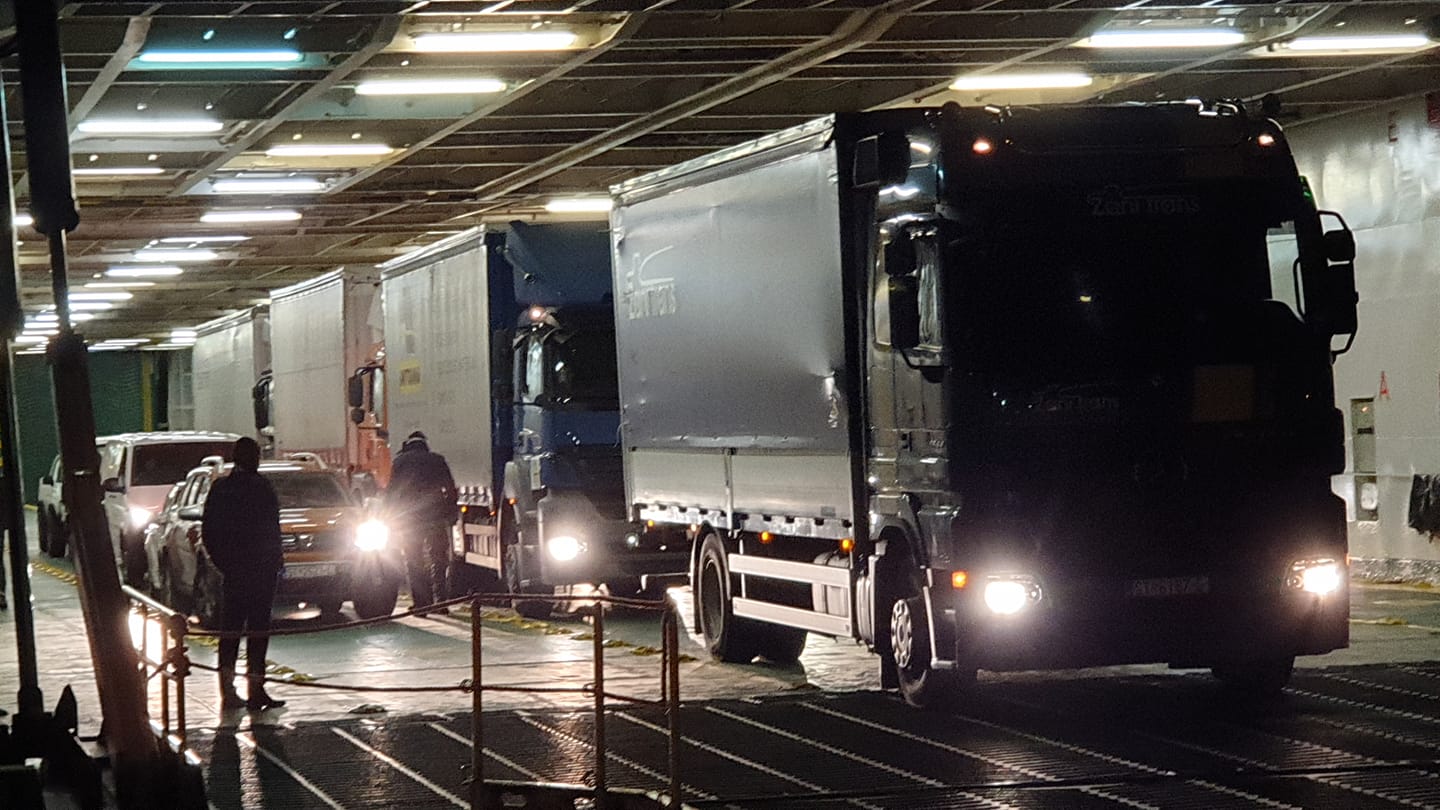
Whoever is in charge of the supply chain is doing an incredible job.
As to are the authorities, who are providing maximum protection for the island at the ferry terminals, which allowing essential travel to maintain supply levels. Here is the evening ferry from Split to Stari Grad last night.
And there is also an excellent online option for islanders on Hvar, Vis and Solta - the Ponuda Skoja (Island Offer), allowing you to order the island's best domestic produce for home delivery. You can learn more on their Facebook page.
So to summarise the current state on Hvar, I would say that we are safe, well-stocked and able to sample the best of local produce. Many thanks to all those who have made that possible, and long may it stay that way.
I will be documenting the island of Hvar under lockdown in the coming days. The first report went out this morning - A 3 Video Tour of the Stari Grad Lockdown on the Island of Hvar.
Corona Voices in the Croatian Diaspora: Arijana from Ferdinandovac in Vietnam
April 18, 2020 - With as many Croatians living abroad as in the Homeland, what are the diaspora experiences of self-isolation? In the 8th of a new series, Corona Voices in the Croatian Diaspora, here is Arijana Tkalcec in Vietnam and originally from Ferdinandovac.
Last week TCN started a feature series called Foreigner Self-Isolation In Croatia: Do You Feel Safer? I can honestly say we have never had such a response or so many incredible contributions. The countries of origin of these expats in Croatia literally from all over the world. So far we have had submissions from expats from Romania, USA, Ireland, UK, Mexico, Argentina, Spain, Singapore, Holland, Canada, India, Hong Kong, Venezuela, Latvia, China, Honduras, Hungary, Moldova, New Zealand, Japan and Germany. You can see all their stories here.
Given the success of the series (still going strong) and large interest, it made sense to expand it to look at this from another angle - how Croatians abroad are coping where they are. If you would like to contribute your story to Corona Voices in the Croatian Diaspora, please find the submission guidelines below. Next up, Arijana Tkalcec in Vietnam and originally from Ferdinandovac.
I'm Arijana, a full-time traveler in the making. I got my masters in journalism but decided to go in a bit different direction from traditional journalism. Coming from Ferdinandovac, a small village in Croatia, I've always dreamt about exploring the world. My itchy travel feet don't let me stay in one location too long. Traveling is my passion, and I'm always on the lookout for new adventures (I especially love treks, waterfalls and van life). I'm a fan of slow travel, which enables me to experience the best of the country I'm in. I love learning about other cultures, getting to know locals, and visiting places without a need to rush.
If you want to follow my adventures, here is my Instagram page: @arijana.tkalcec (https://www.instagram.com/arijana.tkalcec/)
My website: https://shippedaway.com/
Firstly, how are you? Are you alone/with someone? Tell us a little about your situation and sanity levels.
Hello from Da Nang, a beautiful coastal city in Central Vietnam known for its sandy beaches. The city is also popular amongst digital nomads as it has everything needed for a normal life.
At the moment, I'm great, trying to make the most out of the current situation. It took some time to process what's actually happening, but it's all good now. However, I miss the adventure so much! I hate being closed inside.
I'm here with my boyfriend Matej (he's Slovenian), and our plan was to travel around South East Asia for seven months. First, we were in Bali for a month, and now we're willingly 'stuck' in Vietnam. I guess our trip is put on hold for a while. We're still sad about that as we had big plans, but we still hope the situation will get better soon so we can continue traveling.
When did you realise that corona was going to be a big issue?
When we started our journey in January, the coronavirus was already well known. But nobody saw it as a huge threat as it was still mainly in China. When we entered Vietnam on February 26th, there were 0 active cases (16 were reported previously, but all of them were cured). For about two weeks, we explored freely, and everything was normal. We were leaving Can Tho in Mekong Delta, heading towards a small coastal town Mui Ne, when the situation started to change. The cases in Europe began to rise insanely, and there were already reported cases in Croatia too. Vietnam right away started putting some restrictions on foreigners coming from high-risk areas.
When did you realise that corona was going to be a big issue in Vietnam in particular?
Around March 19th our hotel in Mui Ne put the notice about the new case reported 17 kilometers away from our town. That's when the situation here slowly started to change. Restaurants began closing down, hotels closed or had limitations about the number of tourists they were taking in, etc. But those were small changes, and we (as well as other tourists) weren't bothered with that. We continued our trip to Dalat, and there's where we realized that situation is way more serious than we thought. First of all, locals were scared of us as many new cases in Vietnam came from abroad (whether it's through foreigners or Vietnamese coming back from overseas). They would pull up the mask when we were passing by, we even got denied entry to one local restaurant, etc. It wasn't the most comfortable situation. Then masks became mandatory, Vietnam started closing borders, there was a massive cancellation of flights to Europe – it was evident that in the next few weeks/months won't be the most pleasant ones.
Give us a timeline on when and how life changed.
Considering the situation, in Dalat we had to make one of our most significant decisions yet: should we stay here or go home. It wasn't an easy decision for sure, and it took us the whole week to make the final decision to stay. Our families support that decision 100%, and they actually think we're safer here, so they wanted us to stay.
Why did we decide to stay? Firstly, flying in this situation didn't sound appealing to us. Many confirmed cases in Vietnam were connected to flights. Secondly, we already have our ticket back to Zagreb in September from Bali. This would be an additional financial cost that we couldn't afford. The tickets were too expensive, flights were getting canceled, many people got 'stuck' at airports, they had to buy multiple tickets because of the cancelations. It was too risky. Thirdly, if we did come back to Croatia, self-isolation of 14 days was mandatory. The only place we could go to was my parents' house, and that way we could put them at risk too. Lastly, the fact that my boyfriend is from Slovenia, which was already completely closed, made even more problems.
After our final decision to stay, we had to act fast. It was a matter of time when the country would go on lockdown, so we had to choose the place we want to 'get stuck in.' We chose Da Nang. To get there, we took a 6 hours bus to Nha Trang, where we stopped for a few days. The situation there was much different than Dalat. Everything was full of tourists (mostly Russians), many people didn't wear masks, the beach was full of people. We weren't sure what to think about that because the rest of the country was in a full-on panic, while here everything was so relaxed.
It took another 10 hours to reach Da Nang with the train. There was a shocking scene when we entered the Da Nang train station. People in full-on blue suits accompanied by police were waiting at the entrance. One guy held an English sign just for us as we were the only tourists on the train. I was so scared when I saw them as I didn't know what's going on. My first question was: 'What will they do to us?'. But I have to mention how kind and understanding they were. It made me much calmer. All of us went through a temperature check and hand disinfection (two times). As foreigners, we had to fill in some documents. There were questions about which places we visited, where we are staying, when did we enter Vietnam and how, etc.
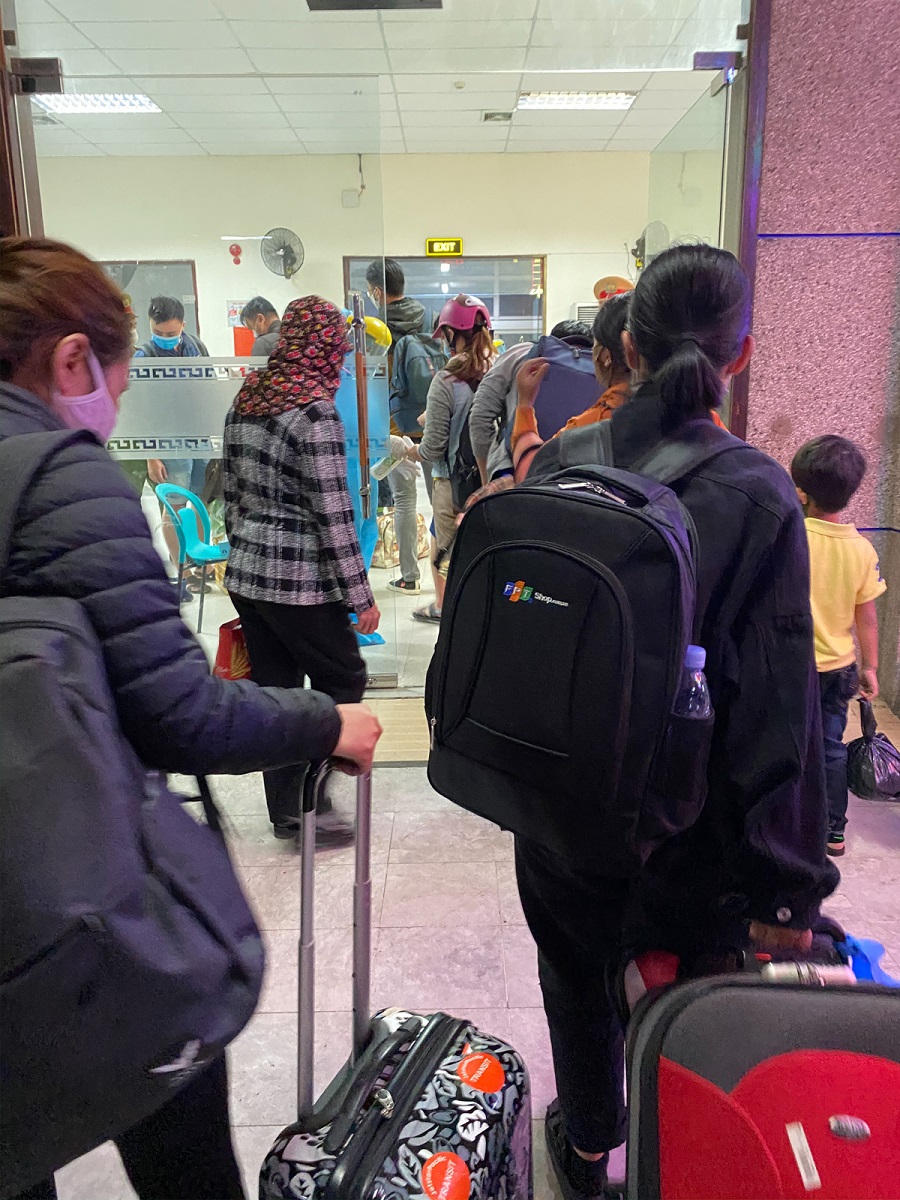
We also had to download their Health Declaration app and fill in our information. Every day the app asks us if we're feeling well or have any symptoms. That way, they can track how we are feeling. If anyone needs any help, they can react much faster than in other countries. Each person is identified with a certain number, which can be scanned through a QR code.
And now we're here. We came to Da Nang at the very last minute. The next day the city was closing down. We got lucky with finding accommodation because many didn't accept foreigners anymore. It was the government's order, so they stop the unnecessary movement.
Tell us about your day. Do you/can you leave your apartment?
The official lockdown (or social distancing measures - the official name they use) was from April 1st until the 15th, but now they extended it for another week. Although there's a huge possibility it will be extended again. We're advised to go out only if necessary, but you can go for a walk, exercise, etc. However, there are many restrictions, especially in the area where we are as it is considered a bit more touristic. The beach is closed. It's not possible to get near it as the police and lifeguards are patrolling the area.
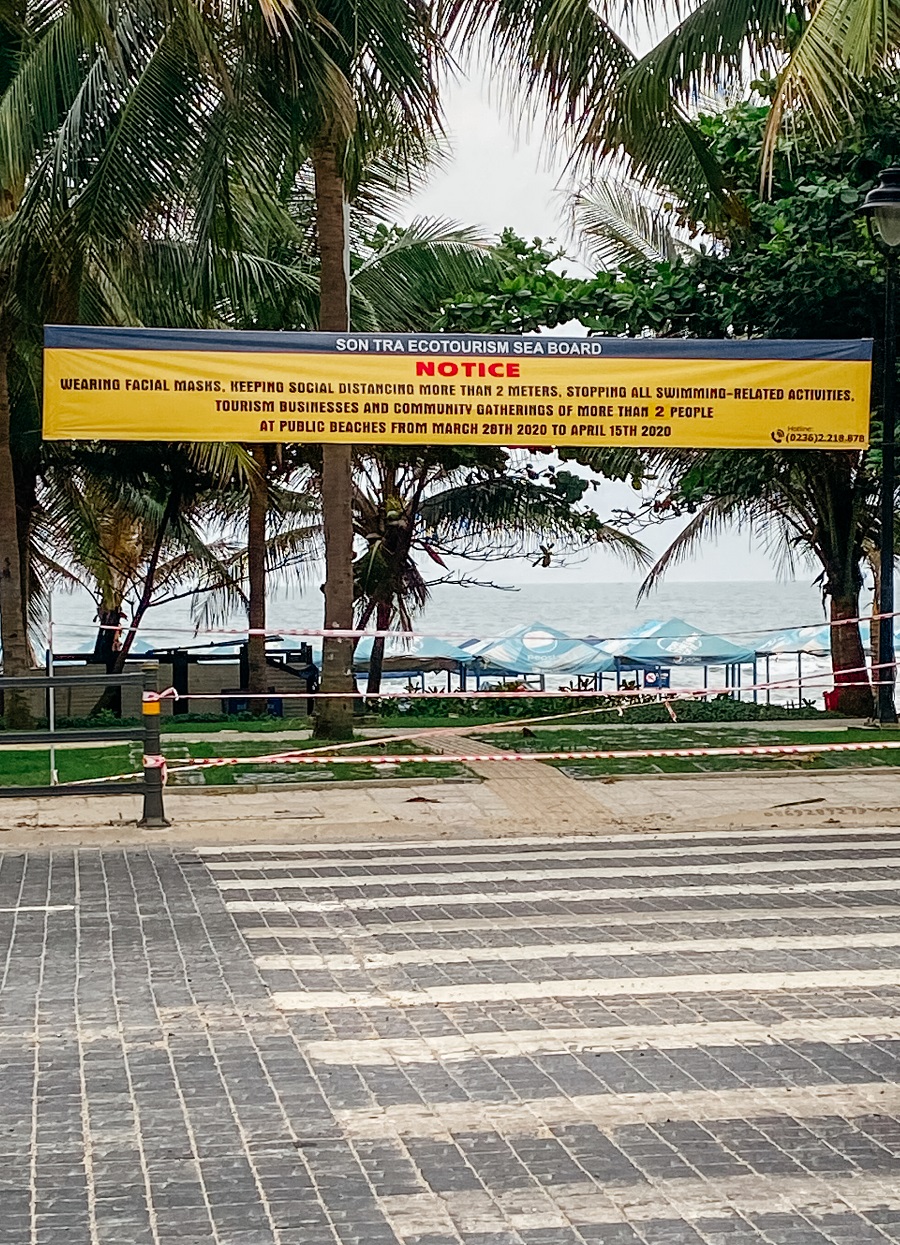
We don't go out much during the day as it's a bit annoying with all the restrictions, and it can be quite busy. That's why we go for night walks around 11 pm. Then we go to the beach because there's no police patrolling the area, and not that many people. Although more and more people started doing the same.
Other than that, we try to make some kind of routine. I finally started working out. This is also the perfect time for learning something new as there are many free webinars and courses about everything. I'm using this situation to improve my skills. There's always something to do. We're not bored at all.
How are the authorities doing at handling the situation?
I think they are doing pretty well. Many police officers are patrolling the area. You know what the rules are, and if you break them, they start whistling right away, letting you know you did something wrong. Other than that, there are fines too, so people are respecting the rules. Vietnam reacted very fast, put strict measures, and they are sticking to it. At the moment, they have only 67 active cases and 0 deaths. For now, we feel safe here.
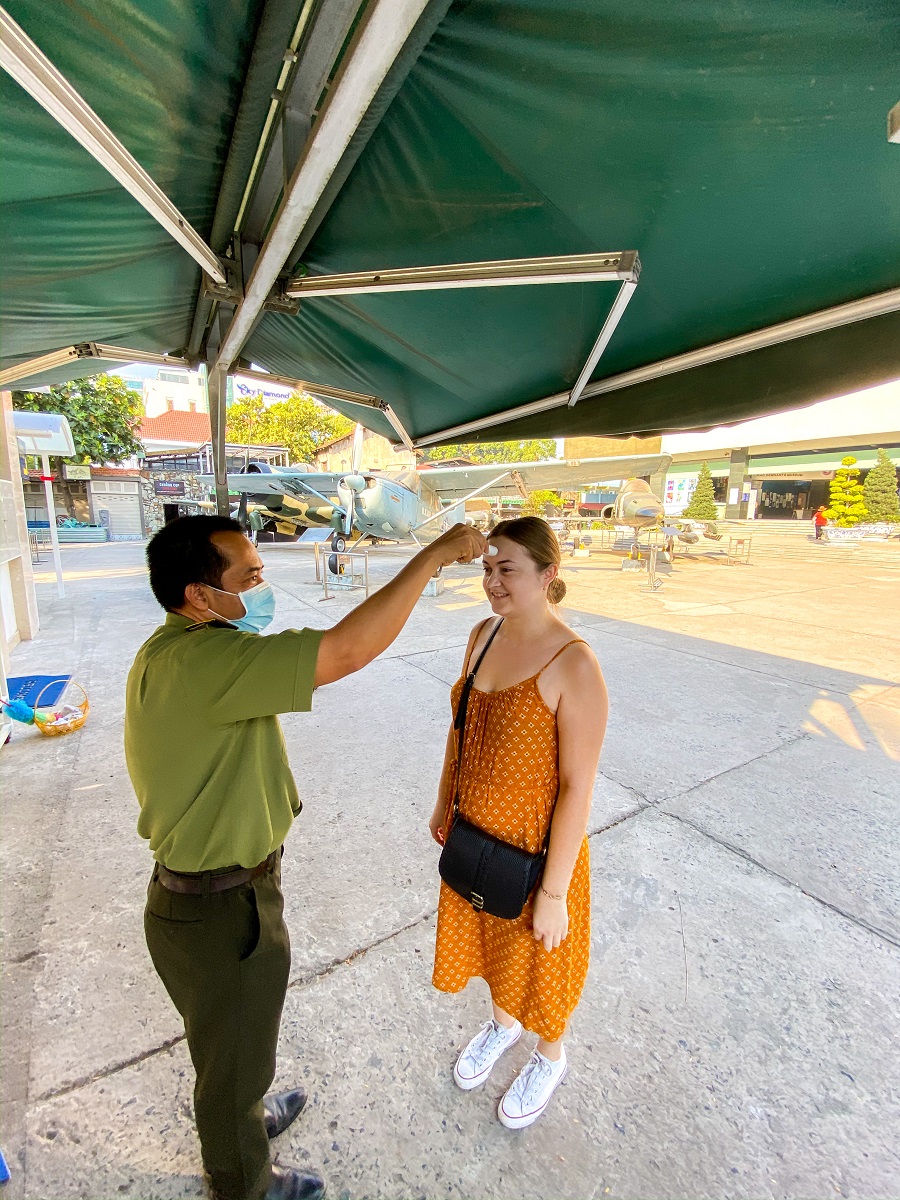
You obviously keep an eye on your homeland. What is your impression of the way Croatia is dealing with the crisis?
Honestly, I don't watch the news that much anymore. I quickly check the situation in Vietnam, so we stay up to date with any new regulations. It was stressing me too much, so I decided to cut that. :D
But when I still watched the news, the only thing I saw was people breaking self-isolation and putting others in danger. If the measures against that were stricter or people were better educated about the situation, I'm sure those cases would be rarer.
Compare and contrast the responses of Croatia and Vietnam. Who is doing what better?
I'm not that familiar with all the measures from both countries. Considering Croatia, I know what I hear from my family, and the thing I dislike a lot is not being able to move from one municipality to another. We know that Croatia has way too many municipalities aka 'općine', and now it is clear that they are entirely useless (it was clear even before but…). For example, my parents are living in the village, which is an 'općina' for itself, and they don't have any big grocery store there. Where to make that 'big shopping' then? The small local stores are so expensive (now even more), and they don't have fresh products. Sometimes, you can also find expired products (without a discount). They're not allowed to go to the small town nearby without a pass (I don't even want to comment on that), so many people in the same situation are having issues. Vietnam also has restricted movement across provinces, but those are much bigger areas, and that makes much more sense.
Also, I don't get how limited the working hours of the stores help. The workers are still exposed to people coming, so what difference does it make. Here the grocery stores work regular hours, which I find better as people spread more equally during those working hours. And people don't stack up on the groceries.
What about official communications from the authorities, compared to your home country?
I'm not sure how it is in Croatia, but here there are signs everywhere explaining social distancing measures. They even have audio coming from the speakers close to the beach explaining the rules. Signs and audio are both in English and Vietnamese. Every day they are sending messages reminding you to wash your hands and stay inside. Online taxi apps (like Grab, which is similar to our Uber) sends you notifications about measures and precautions too. Vietnam even made a viral song about coronavirus intending to educate its citizens. There is also a choreography with dances moves that show the right way of washing your hands. The conclusion is, both locals and foreigners are well informed about everything that's going on.
What's the one thing you wish you had taken with you into self-isolation?
This is a hard question. I don't feel like I miss anything at the moment. However, I wouldn't complain if we had a pool. I'm losing my tan and starting to look like a ghost again (I am very pale). Also, I wish I had more money for all the excellent tools, courses, etc. on huge discounts now. But there's just too many.
One thing you have learned about yourself and one thing you have learned about others during this crisis.
Once again, I learned how much I hate being stuck inside. I was a lot inside before this trip as I worked from home, and the reason we started this trip is for adventure and exploring. And now we're back doing the same. :D
I learned stressing too much about the situations you can't control won't be of any help. You'll just end up being unhappy. The best thing is going with the flow, solve one problem at a time, and adapt to the situation. The faster you adapt, the easier it gets.
In this crisis, you could see the worst and the best in people. Those two extremes were really seen now.
I also learned how bad situations connect people and how many are ready to help. I made some friends in all this mess as we all reached out to one another, trying to make the right decisions.
If you could be self-isolating in Croatia, where would it be, and why?
I don't have any specific location in mind. My go-to place would be the same for any country: some mountain cabin with a lot of nature and a lake nearby, an isolated spot so I could go out in nature whenever I want, without many people around.
Thanks, Arijana. Stay safe and see you on the other side. You can see all the stories in both this diaspora series, and the one on expats in Croatia on this link.
TCN is starting a new feature series on Croatian diaspora experiences of sitting out COVID-19 abroad and comparing your experiences to the situation in Croatia. If you would like to contribute, the questions are below. Please also include a para about yourself and where you are from, and a link to your website if you would like. Please also send 3-4 photos minimum to This email address is being protected from spambots. You need JavaScript enabled to view it. Subject Corona Diaspora
If you would be interested to record a video version for our partners www.rplus.video please let us know in the email. Thanks and stay safe.
Self-Isolation Voices from the Diaspora
Firstly, how are you? Are you alone/with someone? Tell us a little about your situation and sanity levels.
When did you realise that corona was going to be a big issue?
When did you realise that corona was going to be a big issue in New York in particular?
Give us a timeline on when and how life changed.
Tell us about your day. Do you/can you leave your apartment?
How are the authorities doing at handling the situation?
You obviously keep an eye on your homeland. What is your impression of the way Croatia is dealing with the crisis?
Compare and contrast the responses of Croatia and USA. Who is doing what better?
What about official communications from the authorities, compared to your home country?
What's the one thing you wish you had taken with you into self-isolation?
One thing you have learned about yourself, and one thing you have learned about others during this crisis.
If you could be self-isolating in Croatia, where would it be, and why?
TCN has recently become a partner in Robert Tomic Zuber's new R+ video channel, initially telling stories about corona experiences. You can see the first TCN contribution from this morning, my video from Jelsa talking about the realities of running a news portal in the corona era below. If you would like to also submit a video interview, please find Robert's guidelines below
VIDEO RECORDING GUIDE
The video footage should be recorded so that the cell phone is turned horizontally (landscape mode).
There are several rules for television and video news:- length is not a virtue- a picture speaks more than a thousand words
In short, this would mean that your story should not last more than 90 seconds and that everything you say in the report should be shown by video (for example, if you talk about empty streets, we should see those empty streets, etc.).
How to do it with your cell phone? First, use a selfie camera to record yourself telling your story for about a minute and a half. Ideally, it would be taken in the exterior, except in situations where you are reporting on things in the interior (quarantine, hospital, self-isolation, etc.). Also, when shooting, move freely, make sure everything is not static.
After you have recorded your report, you should capture footage that will tell your story with a picture, such as an earlier example with empty streets.
One of the basic rules of TV journalism is that the story is told in the same way as a journalist with his text. Therefore, we ask you for additional effort. Because we work in a very specific situation, sometimes you may not be able to capture footage for each sentence of the report. In this case, record the details on the streets: people walking, the main features of the city where you live, inscriptions on the windows related to the virus, etc.
The same rules apply if you are shooting a story from your apartment, self-isolation, quarantine. We also need you to capture footage that describes your story.
When shooting frames to cover your reports, it is important that you change the angle of the shot (in other words, shoot that empty street from several angles). Also, when shooting a detail, count at least five seconds before removing the camera to another detail.
The material should be about 5 minutes long (90 seconds of your report + frames to cover your story).
After recording everything, send us to Zagreb, preferably via WeTransfer to This email address is being protected from spambots. You need JavaScript enabled to view it.
"Croatia Has All Ingredients to Offer Best Standard of Living in Europe"
April 18, 2020 - Who has the potential to have the best standard of living in Europe? Why one Dutch entrepreneur in Split believes it is Croatia.
One of the many things I love about working at TCN is the exposure it gives me to a wide cross-section of people, opinions and backgrounds regarding Croatia. I have never come across a country with such polarised opinions about absolutely everything. It brings an extra challenge to reporting on things here, and I long ago gave up on thinking that I would ever write an article that everyone would agree with.
As I get older, I find that I am placing less emphasis on the opinions of people in faraway lands with Croatian heritage but no more experience of the realities of life in Croatia beyond a fortnight on an Adriatic beach each summer, and more emphasis on the opinions of people who have not only tried to make a living here, but who have succeeded. And if one of them managed to employ over 400 locals on the way, then all the more reason.
I often call Ognjen Bagatin, the charismatic and dynamic CEO of Bagatin Clinic, Mr. Positive. For an international ambassador of positivity, look no further than Jan de Jong in Split, whose latest LinkedIn post focuses on how Croatia could have the best standard of living in Europe.
[I am not dreaming - I am wide awake]
Did you know that the Dutch tourism industry is 8 times larger than that of Croatia?
Yet, in the Netherlands, people barely talk about the importance of this industry, because it represents only 3% of the Dutch GDP. (Vs. 20% in Croatia)
To me, this only shows the growth potential Croatia still has in other sectors of the economy. And that's exactly what I believe Croatia's entrepreneurs should be focusing on.
Do we really need more apartments, or another hotel, or another pizza place?
How about agriculture, the service sector, production, exports?
For 5 months a year, we can't find enough waiters, chefs, cleaning personnel. But when somebody graduates from university, they have a hard time finding a job.
Is there nothing we can learn by watching closely at what entrepreneurs do in other countries? Plenty of great company solving problems at large and doing things that are not being done in Croatia yet. And then, when I say that there are so many opportunities left in Croatia, people think I am dreaming...
If you would only see what I see you would realise that I am wide awake.
Croatia, the land of unexplored terrain, the land of opportunities.
#LivingTheCroatianDream #entrepreneurship #Croatia
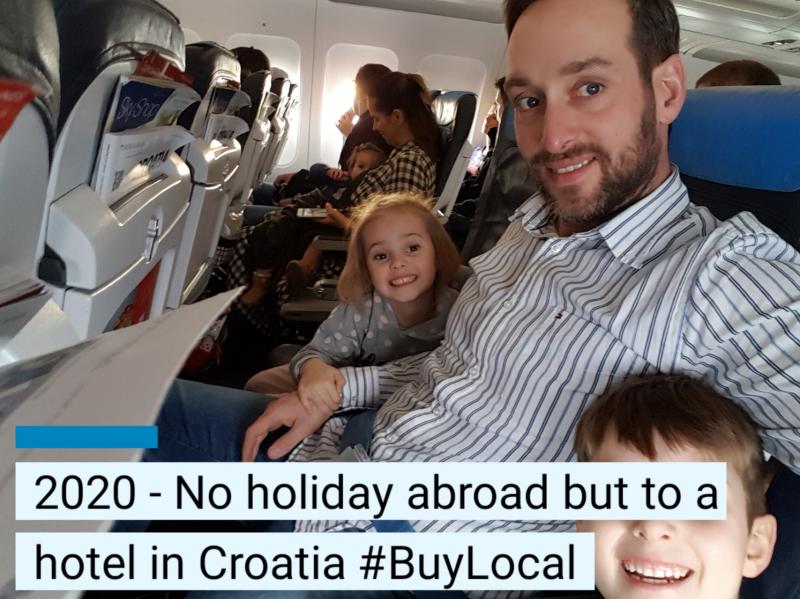
Read more from Jan de Jong in 5 Things I Learned from Croatian People.
To learn about Jan's entrepreneurial story in Croatia so far - it is a great one - check out his interview in our Foreign Entrepreneurs in Croatia series.
Disgruntled Residents Join "Pots and Pans Demonstration" against Zagreb Mayor
ZAGREB, April 18, 2020 - Following a call made by Zagreb City Assembly opposition councillor, Tomislav Tomašević and a few NGOs, residents in Zagreb's various neighbourhoods took to banging on pots and kitchen utensils from their balconies on Friday to show their dissatisfaction with Mayor Milan Bandić.
Earlier on Friday, Tomašević, who is the whip of the left group in the Zagreb City Assembly, called on residents to join "a cacerolazo " at 7 p.m. Friday and that by making noise by banging pots, pans, and other utensils, they could tell Mayor Bandić "enough".
"We can't protest in (Ban Jelačić) square because of the corona measures, but we can make noise on our balconies and windows, regardless of what Bandić and the police think about that 'disturbing of the peace'. Let them fine half the city if they can. Bandić pretends he didn't hear the banging last time, but tonight it will be louder. Let Bandić's people and 'business partners' and HDZ members who may live on your street realise that this way of running Zagreb is through, Tomašević said in a press release before the pots and pans demonstration in the evening.
The call for the protest was made by the NGOs The Right to the City, Green Action and Zagreb Is Calling You. They urge dissatisfied citizens to go to their windows and balconies, just as they did on 3 April when they also banged at their pots and pans and blew whistles in protest at how Bandić was running the city in the present situation caused by the coronavirus epidemic and the March 22 earthquake.
A Green Action activist, Bernard Ivčić, told Hina on Friday evening, that residents once again showed that they were fed up with the way how the city was run.
In his comment to the latest protest, Tomašević told Hina that this evening's pots and pans demonstration was louder than the previous one.
More Zagreb news can be found in the Lifestyle section.
Croatia to Start Serology Testing for COVID-19 Next Week
ZAGREB, April 18, 2020 - The head of the Croatian Institute of Public Health, Krunoslav Capak, said on Friday that the authorities would start conducting a serological survey next week to determine the prevalence of COVID-19 in the country.
Capak told the national broadcaster HTV that the performance of the survey should take 10 to 14 days so as to provide a wider insight in the situation.
Experts at the institute and at Zagreb's hospital for infectious diseases are making preparations for the testing so that they can establish how much serological tests would be reliable.
Serological surveys are often used by epidemiologists to determine the prevalence of a disease in a population. These surveys are sometimes performed at random, anonymous sampling from samples taken for other medical tests or to assess the prevalence of antibodies of a specific organism or protective titre of antibodies in a population.
Capak thinks that yet not enough number of Croatians are immune to this infection to provide for "collective protection" against this novel virus. However, this will change for the better later, according to his explanation.
More coronavirus news can be found in the Lifestyle section.
Officials Extend Easter Greetings to Orthodox Believers
ZAGREB, April 18, 2020 - With the traditional greeting "Khristos voskrese!", President Zoran Milanović on Saturday extended best wishes to citizens who celebrate Easter according to the Julian calendar.
"The holiday of Easter teaches that, despite all setbacks and hardships, there are always hope and solutions for a better tomorrow if its significance is accepted genuinely and with full faith. May the significance of this, the biggest Christian holiday be an incentive to seek new strength for personal growth and to us all an incentive to better cooperation, mutual understanding and tolerance," the president said.
Recalling the responsibility of all citizens for the creation of a functioning society which respects dialogue and diversity, he wished that believers who celebrate Easter according to the Julian calendar spend it merrily and peacefully with their dearest ones.
Prime Minister Andrej Plenković on Saturday extended Easter greetings to believers who celebrate it according to the Julian calendar on his and the government's behalf, wishing them plenty of peace, faith, hope and unity.
"In the spirit of the biggest Christian holiday, which encourages us before all life's challenges, I wish you and your families an abundance of peace, hope and unity. May you spend this Easter time in an atmosphere of solidarity, patience and responsibility," the prime minister wrote in his note, wishing everyone a happy and blessed Easter.
Parliament Speaker Gordan Jandroković also extended Easter greetings to Orthodox believers in Croatia on his and parliament's behalf, wishing that the Easter light give them strength, faith, hope, interior peace, health and joy of living.
"The resurrection of Jesus is the basis of the Christian faith and spirituality. It symbolises the victory of life over death, light over darkness, good over evil," he wrote in his note.
At a time when we are faced with a big crisis which has put our way of life to the test and which requires many sacrifices of us so that we can preserve first and foremost our own health and safety, as well as those of our nearer and wider community, the resurrection of Jesus should give us additional life encouragement, Jandroković wrote.
"Therefore, I wish for the Easter light to give you strength, faith, hope, interior peace, health and the joy of living. May it especially encourage you to closeness, solidarity and everyday care for the members of your family, neighbour and all weak and needy persons in our society. Only in that way can we overcome all the current challenges together."
More religion news can be found in the Lifestyle section.
Oleg Butkovic Teases Cheaper Motorway Usage for Croatian Citizens
As Morski writes on the 17th of April, 2020, Minister of Maritime Affairs, Transport and Infrastructure, Oleg Butkovic, spoke to RTL Today (Danas) about new measures being prepared by his particular ministry.
''There was no discussion at the state level about the arrival of Czech tourists to Croatia. It ' too early to talk about that at the moment, such a scenario, meaning the the arrival of Czechs or any other foreign nationals is not possible at this moment in time. It's necessary to consider the epidemiological situation in Croatia and in whichever other country. However, the scenario should slowly start being prepared that this situation will normalise and that the curve of those infected by coronavirus will begin to fall across all countries, and that's why all of us ministers have been given the task of preparing measures for when that moment comes by the Prime Minister,'' Oleg Butkovic said.
His department has done its part, he says, they have prepared a number of measures that they think should be discussed, and epidemiologists will need to provide their concluding statements on all this.
''We believe that in the transport sector, some measures should be eased, and public transport should, we believe, be gradually introduced, for example on a Sunday timetable. In regard to maritime transport, we propose to introduce some Zadar-Ancona catamaran lines just for freight. The current topic is also the formation of transit traffic through Croatia, in this part, we think that it should be considered that it no longer be done with police escorts but with the existing corridors, and that you can stop only in certain places,'' said Oleg Butkovic, emphasising once again that everything will eventually be decided on by the epidemiologists.
One possible idea could particularly appeal to Croatian citizens, and that is the cheaper use of the motorways for them.
''We're also considering the possibility of reduce the [road] toll in the summer for Croatian citizens. By about 10 or 20 percent, but these are all things that are still being discussed and will continue being discussed,'' Oleg Butkovic said.
Oleg Butkovic's ''field'' has been among the worst hit by the coronavirus crisis, with transport having all but been halted. Croatia Airlines, which has been falling short for a considerable amount of time now, and since long before the pandemic broke out, is another victim of it.
''The government will do everything to save these companies. This crisis has not only affected Croatia, we're going to seek a common solution at the EU level,'' assured Butkovic.
''None of this really depends on us, but on the situation with the coronavirus and the number of patients there are, but we're preparing everything to normalise the situation in Croatia as soon as possible,'' he concluded.
Follow our dedicated section for more on coronavirus in Croatia.


